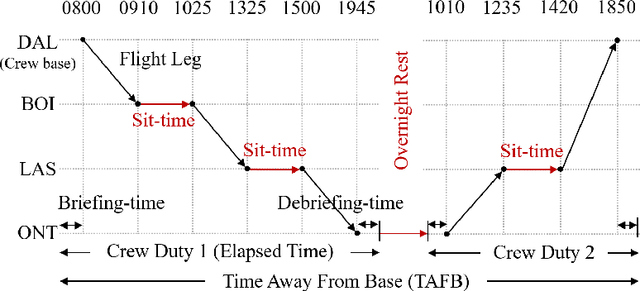On Initializing Airline Crew Pairing Optimization for Large-scale Complex Flight Networks
Paper and Code
Mar 15, 2020



Crew pairing optimization (CPO) is critically important for any airline, since its crew operating costs are second-largest, next to the fuel-cost. CPO aims at generating a set of flight sequences (crew pairings) covering a flight-schedule, at minimum-cost, while satisfying several legality constraints. For large-scale complex flight networks, billion-plus legal pairings (variables) are possible, rendering their offline enumeration intractable and an exhaustive search for their minimum-cost full flight-coverage subset impractical. Even generating an initial feasible solution (IFS: a manageable set of legal pairings covering all flights), which could be subsequently optimized is a difficult (NP-complete) problem. Though, as part of a larger project the authors have developed a crew pairing optimizer (AirCROP), this paper dedicatedly focuses on IFS-generation through a novel heuristic based on divide-and-cover strategy and Integer Programming. For real-world large and complex flight network datasets (including over 3200 flights and 15 crew bases) provided by GE Aviation, the proposed heuristic shows upto a ten-fold speed improvement over another state-of-the-art approach. Unprecedentedly, this paper presents an empirical investigation of the impact of IFS-cost on the final (optimized) solution-cost, revealing that too low an IFS-cost does not necessarily imply faster convergence for AirCROP or even lower cost for the optimized solution.
 Add to Chrome
Add to Chrome Add to Firefox
Add to Firefox Add to Edge
Add to Edge